Last week Nathan and PJ introduced us to Americans Elect 2012 by asking the question: “Can we elect a ‘wikipedia’ president?” The idea is seemingly straightforward- define the broad categories you find most important (your “colors”), answer questions to determine the popular positions of most Americans, and find candidates that most closely resemble your opinions on the issues. The result is a “third party” candidate on the ballot in all 50 states with a platform that most people agree with.
I have reservations about this process, and they fall into three categories. 1)Poorly designed questions. These questions are confusing and might not elicit the responses people intend to give. 2) Leading questions. To be fair, the language that Americans use to talk about politics is full of pre-defined frames and evocative images that push people in certain directions. It is virtually impossible to create a set of questions that extracts the thoughts of individuals with total neutrality. Our thoughts are like electrons- the act of observation changes their behavior. 3) The reinforcement of ineffective partisan thinking. From the Americans Elect website:
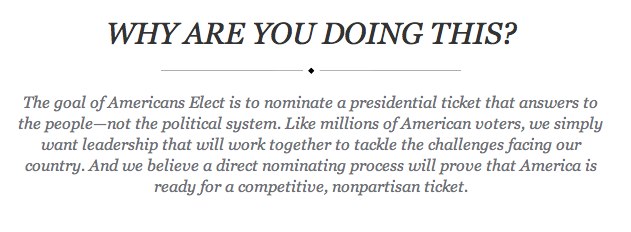 1)Poorly Designed Questions
1)Poorly Designed Questions
Let’s take a look at a two foreign policy questions:
Both questions are too vague to illicit meaningful data. In the first question about troops abroad, is it referring to those stationed in Iraq and Afghanistan? What about our intervention in Libya? Does this mean we should close up all of our overseas military bases in Germany, Japan, Panama, Belgium, Italy, Kuwait, Saudi Arabia, etc. etc.? Does this imply that we still use unmanned drones? What about cyber warfare? It might sound like nit-picking, but does an effective question elicit the same answer from both a pacifist and a proponent of drone warfare? In the second question, the terms “significant investments” and “resources” are far too-vaugue to evoke a meaningful answer. Person A’s answer may imply humanitarian aid for injured parties, while person B may select the same choice but advocate the utilization of the federal government and the IMF to liberalize trade barriers. Both parties, each with very different intentions, will likely select the same answer.
2)Leading Questions
There are many of them. Leading questions frame the issue with a certain slant. For instance:
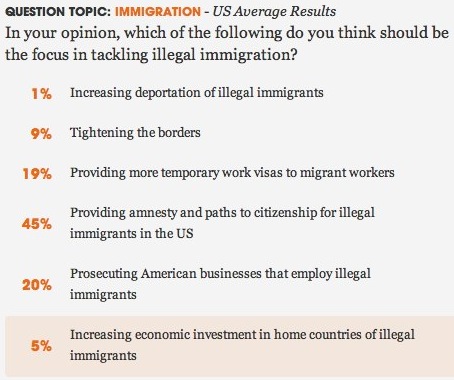 The term “tackling” is already confrontational, but even more problematic is the term “illegal immigrant.” This term carries strong negative connotations. One’s identity is not “illegal.” There are many complicated relationships and life events that bring an individual from their home country to the United States. To relegate them to a single illegal status is one particular viewpoint. These words are rhetorical tools, and embedded within them is the power to change minds and frame debates. While a plurality of respondents chose amnesty, the question’s wording makes it easier to argue for prosecution at a later time.
The term “tackling” is already confrontational, but even more problematic is the term “illegal immigrant.” This term carries strong negative connotations. One’s identity is not “illegal.” There are many complicated relationships and life events that bring an individual from their home country to the United States. To relegate them to a single illegal status is one particular viewpoint. These words are rhetorical tools, and embedded within them is the power to change minds and frame debates. While a plurality of respondents chose amnesty, the question’s wording makes it easier to argue for prosecution at a later time.
3)The Reinforcement of Ineffective Partisan Thinking
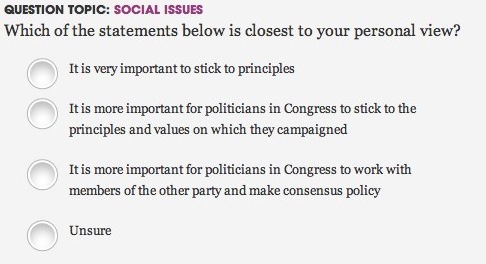 An organization based in the principle of nonpartisanship, should not ask this question. Can’t one have a principle that requires that they work with members of the other party? We are already back into the partisan fray. Without much thinking we can figure out how a mainline Republican or a Democrat would answer the following:
An organization based in the principle of nonpartisanship, should not ask this question. Can’t one have a principle that requires that they work with members of the other party? We are already back into the partisan fray. Without much thinking we can figure out how a mainline Republican or a Democrat would answer the following:
You might be thinking- “Well, we need to stop assuming all Democrats are pro-choice and anti-gun, and Republicans want to ‘drill baby, drill.” But the problem is not the division into categories, but the categories themselves. These dichotomies have already been set up. The truly innovative thinking will come when we realize that the solution to our energy crises may come from also saving the environment.
Until Americans Elect radically changes the question system, we will end up with a candidate that may jump across the aisle a few times, (a social progressive with conservative economic stances, for example) but we will not come close to transcending partisanship. The candidate selection process might be novel, but the content of the issues are presented in the same dichotomies that Americans Elect identifies as the problem. Truly innovative (even radical) thinking will come from a politics that shatters these dichotomies and finds solutions in the rubble.


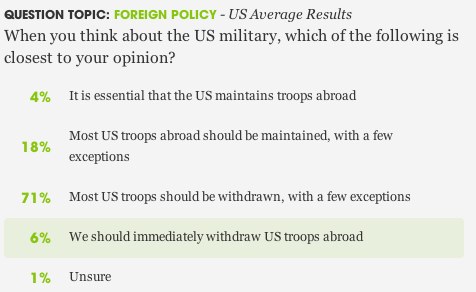
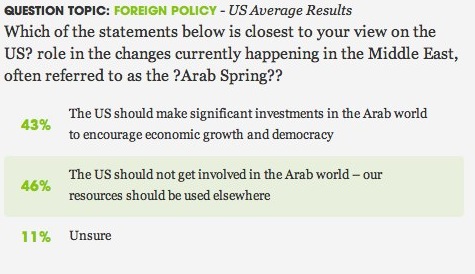
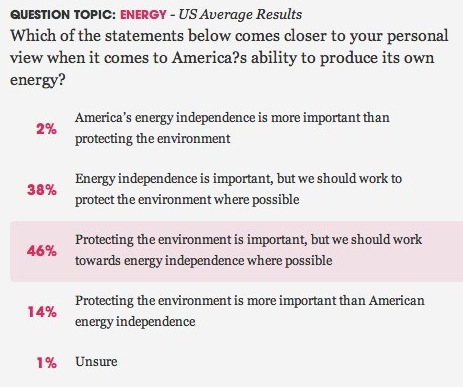
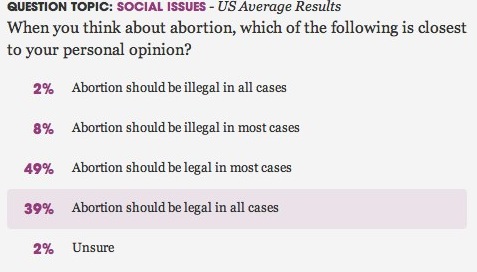
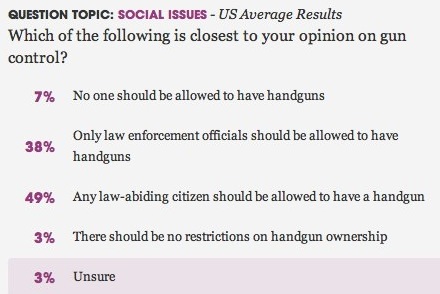
Comments 29
nathanjurgenson — July 26, 2011
perhaps the questions themselves should have been created as a Wiki? but the general point may be that this will not be a truly open-sourced campaign, but just one more open than the others. much the same could be said for Wikipedia, which while more open than Britannica, is still created/edited by a relatively small group of (white, male) individuals.
my guess: Americans Elect will transform cyber-libertarianism into electoral-libertarianism. i think this will be a quick way to produce a libertarian candidate. there is a rising tide of independents who like the republicans fiscal conservatism (but the moralism) and like the democrats social progressivism (but not more taxes even on the wealthy). this is libertarianism. and the politics of the web is certainly libertarian. therefore, it would be very surprised if America Elects produces anyone other than a libertarian candidate (who will piss of the right for not being religious/traditional enough and will piss off the left for cutting social programs for the poor while keeping the wealthy from paying more taxes).
Replqwtil — August 20, 2011
I see this gerrymandering of questions as particularly troublesome when attempting to develop a new, more "democratic" electoral process. It seems clear that the questions themselves, as well as the topics under discussion, should be the role played by the crowd, not simply their responses. This exercise in many ways makes me think of Baudrillard's point about the question eating the Answer.
My own view in developing a decentralized and democratic system from the lowest levels of personal interaction would stem more from a Reddit syle system. All topics, all questions and all answers should be proposed, developed, and voted on by the participants themselves. Wikis strike me as a system meant to derive authoritative responses on behalf of an invisible crowd, whereas a Reddit system is more about developing the legitimate common interestests and points of contention between the members of that crowd as individuals. The consensus doesn't come from a behind the scenes tabulation or discussion, the consensus Is the discussion.
Do you think that a system in which the crowd is responsible for the entire discussion, not only as participants, but as the instigators, moderators and directors of it, would serve to better attain the goals of Americans Elect?
RJW — August 23, 2011
There are legal and illegal immigrants. The problem is with the illegal ones. Why does the writer have an issue with the term, "illegal immigrants"? It SHOULD have strong negative connotations. The issue is not WHY they came here, but rather HOW they came here. Their very presence here makes them criminals.
This new 2nd process for electing a president, with its questionnaire of preferences, smacks of online dating services. Instead of reviewing your closest matches, and picking a date, you pick a CANDIdate. The problem with it is that, if he/she is elected, and you find out that your compatibility isn't what you thought it was, you're stuck going to all of the dances with the one that brung ya (or rather, that YOU brung)for the next four years.
James — August 24, 2011
I have a lot of interest in the development of americans elect (or similar process). Although I doubt the concept will take a foothold very quickly, it obviously has to start somewhere. All of this discussion and criticism will lead to an improved system. Every new innovation starts off slow and with defects- I personally don't buy the 1st generation phone, laptop, GPS or anything else for that reason. Everything improves with time...it improves or it goes away. (Natural selection, if you will)
I really like the idea of delegates developing the questions...my chief concern is the candidate (and/or party) who uses americans elect poll data to groom their responses, to campaign and to skew the process thru manipulation.
My point is that americans elect certainly has room to grow. Lets foster that growth and each of us be involved.
P.S.- RJW is most certainly correct about "Illegal" immigration. You may disagree with the current law but you cannot dispute the status of these individuals as "illegal." I may disagree with the speed limit because I think it's wrong/impractical but that does not give me the option to disregard the law without any expectation of consequences or enforecement.
James — August 31, 2011
Replqwtil- I agree with you on a few points; illegal status DOES lead to some exploitation also, you will never see amnesty for those who break the law.
Your comparison of tyrant policemen ticketing and harrassing drivers willy nilly, at their own discretion does sound very unfair. The fault in that logic is that the US does not deport LEGAL citizens, LEGAL residents or LEGAL immigrants. Authorities enforce the law for those who have broken the law ONLY. Tyrant policemen may just pull over anyone they like but there are LEGAL ways to immigrate to this country and only those who have done so ILLEGALLY should have any reason for concern.
I (and many others with my point of view) are not blind to the hardships in other countries, the attractiveness of opportunities in the US or the plight of illegals who are unable to make a legitimate living here. However, no country (the US or another) should ever REWARD illegal activity. There are basic needs such as food, shelter and medical care that cannot be ignored for those already here, but that should not ever interfere or supercede enforcing deportation or other types of enforcement of the law.
There are international practices such as, ASYLUM and REFUGEE status for persons who meet specific criteria.....for others, there is a LEGAL means to immigrate.
It is far more responsible for US voters to advocate an easier immigration process than amnesty. Any immigration process that screens for criminals running from their home countries, organized criminals, infectious disease carriers, known terrorists, sex offenders, illegal drug affiliates and other undesirables is far more attractive to me personally than anything remotely related to amnesty. Rewarding someone for doing the wrong thing removes accountability from our society.
Immigration in necessary- LEGAL immigration.
James — August 31, 2011
I really DON'T see why the very category of "illegal immigrants" is a misnomer. I think the term is very important and furthermore ACCURATE. There are actually more than 1 million illegal immigrants crossing the US border each year (estimated); most of them from Mexico. If 1 million people cross your border, it is wise to consider it an invasion.
I believe that the US economy is more than capable of thriving with the absense of illegals.I also think the drain on public welfare, food-stamps, the medical industry, the Justice Department, and liability/injury and loss of property due to people operating without insurance and/or financial liability is crushing the State and local governments of this Nation.
If the US government had any necessity to systematically create a class of persons to do meanial labor, they merely need to open the LEGAL immigration flow, like a faucet. If there were vacant jobs, industries in need of labor, the Dept of State could easily approve the MANY, MANY applications of LEGAL immigrants sitting on file. LEGAL immigration for those who are medically screened, pay filing fees, undergoe interviews and background checks and have the requisite skills to work in the US are stifled by illegal immigration. The more ILLEGAL immigrants that cross the border, the fewer LEGAL immigrants are allowed to do so.
Illegal immigration undermines legal immigration. It oppresses THOSE people and stops them after they have tried to follow the rules. It's very sad.
James — August 31, 2011
You make some valid points about illegals having little to know legal recourse when they are exploited. I think our opinions differ with the word "illegal" and the concept of amnesty. At the core, we agree that a person without legal status is at a disadvantage. We differ again in that you feel that the government has a responsibility to validate that status for the protection of the individual, whereas I feel that that responsibility lies with that individual.
An illegal mother who gives birth to an "American born" child is eligible for food stamps and public assistance; usually $200-$300 monthly (as one example)....the American taxpayer carries that burden.
Good conversation, I don't believe there is a simple answer and that is the root of problem in terms of developing fair policy and regulations. This issue warrants healthy debate and certainly CHANGE. Have a good night.
Britney — August 31, 2011
The problem with the term 'illegal immigrants' is not that their actions ar not illegal, but that the idea of calling a person 'illegal' is unjust. Actions are illegal, substances are illegal, people are not illegal. They are people. Terms like 'undocumented migrants' are generally preferred by linguistically sensitive individuals in the human rights movement because they recognize the fact that calling an entire class of people 'illegal' demonizes them in a way that is hurtful to the cause of immigration reform. Illegal immigrant is a loaded term, and it doesn't do justice to individuals who are part of a flawed system that needs to be reformed.
James — August 31, 2011
Brit- You can call them undocumented saints of Zion or righteous travelers without identification or any other semantical description you like. The reality that these people BREAK the law; Federal Law, is no less true. Entering this country outside the legal means is illegal. It's not up to interpretation. Seriously.
You can disagree with the law, change the law, change the terminology or whatever you like; but until you do, illegal immigrants are illegal. People can be illegal in their actions. Trespassing is illegal, rape is illegal, drug trafficking is illegal: those are VERBS (actions). The people themselves aren't illegal, their ACTIONS are illegal. A trespasser is defined as such by his actions. You could call him an "illegal" trespasser but that would be like calling someone an "illegal" rapist....the term you use becomes ridiculous using it in the way you define status. It changes nothing.
Your energy is best used to change the law, not the terminology. Your points have some validity for changing the law but have absolutely no bearing on the issue of terminology to describe a person who acts illegally. You can call a murderer a flower if you like, he still deserves his punishment under the law nonetheless.
Britney — August 31, 2011
Changing the law is impossible unless you change the way people think about the law. We all use frames to understand the world, and terminology is important. So long as these people are objectified as 'illegal' it will be hard to convince others that their plight is worth fighting for. Immigration reform needs to happen, and part of convincing other individuals of that, which is the only way to change the law, it's important to change the way we talk about undocumented workers. They are people and they deserve our respect.
James — August 31, 2011
There are 2 types of illegals 1) Those who would otherwise qualify for residence (but have no opportunity to do so) but are merely here in an undocumented way- yes, they certainly deserve our efforts and respect and our help. 2) those who should never be allowed to immigrate- they deserve deportation and nothing more.
Both types of illegals break the same law. The former deserves consideration to "make things right" and continue to live in the US in a legal way with rights and protections. The latter have no business in the US and are a burden to the former and the American people as well.
We all deserve an opportunity for the pusuit of happiness. No man, woman or child deserves a free ride (without consequence). Well intentioned, temporary assistance aside, all people have an obligation to make their own way in this world and contribute to society.
RJW — August 31, 2011
We can bandy about the semantics of this all day long. A person who commits a crime is called a criminal. A person who commits an act of illegal immigration is an illegal immigrant. We could call them criminal immigrants, since their very act of coming here illegally makes them criminals, whether or not you think that the laws which make them so are fair and just.
Undocumented migrants? Linguistically sensitive? Are these the politically correct terms now? Being "politically correct" to some, is removing any negative connotation - I am thinking of "sanitation", and, "domestic" engineers", "flight attendants", and, "food servers". To others, and I freely admit that I am amongst this group, "PC" is really nothing more than boiling down a term so that the meaning falls right off of the bone. One of the pitfalls is that if we are not even able to standardize the nomenclature, and keep it that way, how can we hope to have the correct grasp of the issue? We love to skirt around uncomfortable issues, never really coming to grips with either the problem, or the solution. No one wants to feel bad (which is a whole other Pandora's box).
The people who talk the most about immigration reform are mostly the illegal immigrants and their supporters. Of course they want reform. Those of us who feel that illegal immigration is a real problem, and that we have a right and a responsibility to secure our borders, simply want the laws that are already in place to be enforced. While we are doing that, we can discuss what reforms are needed regarding those who seek the promise of an opportunity of a better life.
Lest we forget how critical campaign and election reform are, I feel I ought to reiterate that the original topic of the piece was Americans Elect 2012. I began my initial reply with an opinion of just one of the author's issues with that organization's questionnaire. Our ongoing and lively debate illustrates what an important topic illegal immigration also is.
I offer that we are fortunate to have forums such as this to air our views, where important issues, discussed in a sane and rational manner, can hopefully mitigate extremism, result in some meeting of the minds, and foster compromise and problem solving. I congratulate you all for having the courage of your convictions to voice your opinions, and the facility to do so articulately.
Replqwtil — August 31, 2011
Having completely hijacked a comment thread about electoral processes to discuss the thorny topic of immigration, I thought I might as well share this video which is not entirely unrelated.
http://www.youtube.com/watch?v=8-h8EBP0JSs
While these workers are "legal", I see this story is demonstrating the kind of exploitative labour on which the American system relies. To be 'competitive', American businesses need to cut wages, which means undercutting local labour forces with imported labour which can be mor easily exploited. This is the type of institutional violence that I am trying to bring up. There is a need for an exploited underclass, and "illegals" serve that role. That is why I see "illegal" immigration not only as a problem to be solved, but as an institutional practice which some companies actually rely on.
I know I'm a little outside the box here, since these student workers are not "illegal", however they do face similar pressures. Actual illegals don't even have the ability to organize that these students are showing, thus making their situation vastly more precarious, and their exploitation commensurately higher.
Just some food for thought.
David Banks — September 10, 2011
A little late to my own game here, but I really appreciate the spirited discussion. I think I would be reiterating points already made, if I were to jump in so instead I will let Bush 41 and Ronald Reagan do the talking for me.
This is how you talk about immigration:
http://youtu.be/Ixi9_cciy8w
Finder's credit actually goes to Britney.
Michael Jay — September 14, 2011
The --REAL-- problem with Americans Elect (and perhaps telling of their loaded and leading questions) is apparent in their bylaws. Jim Cook of the blog site Irregular Times has been on this for some time now. As he highlights:
==========
"For those who say “Americans Elect can’t possibly think they’ll win this thing. What do they want?” the bylaws provide one possible answer: a seat at the negotiating table in November and December of 2012, with the occupancy of the most powerful position in the world at stake. With the application of some careful strategy, the Americans Elect corporation could be in a position to obtain policy concessions of all sorts, even if it loses the popular vote disastrously.
In such a circumstance, the rules by which Americans Elect would choose a major presidential candidate to endorse is of central importance. If the rules give control to the Americans Elect delegate pool (which any registered voter — sort of — can join), then there would be some aspect of democracy to the endorsement. However, if the rules give primary control to the Americans Elect corporate leadership (which according to bylaw Article 4 appoints itself and cannot be removed by delegate vote), then the unelected leaders of this corporation would be in a position to decide the outcome of a presidential election — and to obtain favorable terms for tipping the outcome in one direction or another.
The rules for an Americans Elect endorsement are not specified in the bylaws — and to date Americans Elect hasn’t even posted these bylaws on its own website. Now is the time to asking Americans Elect questions about those rules. Pay attention to Americans Elect’s answers… or lack of answers."
==========
Further, Cook has been following AE's leadership board shuffle - including the recent addition of Daniel Winslow, a former aide to Gov Mitt Romney and Sen Scott Brown and CURRENT Republican member of the Mass House of Rep's, and who recently co-sponsored a bill to strip union workers of their collective bargaining rights (a la the Wisconsin legislature). Their newest addition of leaders are almost exclusively from the field of wealth management.
That said, there is an effort to produce some sort of transparency within Americans Elect. Apparently a member in AE's message board section has formed what he calls a "AE Transparency and Conscience Caucus", which you can join by signing an online petition which can be found here: http://getsatisfaction.com/americanselect/topics/the_ae_transparency_conscience_caucus_join_the_caucus_sign_the_pledge
Americans Elect is a great idea, but keep in mind it's still considered a corporation (a 501c4 corporation, to be exact) with corporate donors. What we could be thinking is a revolution for democracy with an internet-driven third-party candidate could in fact be yet another ploy of the internationally wealthy minority to steal away votes and undercut the voice of the American majority.
__________
Americans Elect bylaws (READ if you plan on giving money!): http://irregulartimes.com/index.php/full-text-of-americans-elect-bylaws-as-of-july-1-2011/
Jim Cook at Irregular Times: http://irregulartimes.com/index.php/archives/author/jim/
Cook's "Americans Elect Plans to Broker 2012 Elections": http://irregulartimes.com/index.php/archives/2011/07/21/americans-elect-makes-plans-to-broker-the-2012-presidential-election/
Cook's "Americans Elect Names New Leaders": http://irregulartimes.com/index.php/archives/2011/09/09/americans-elect-names-new-leaders-in-presidential-effort-all-wealth-management-execs/
David Banks — September 14, 2011
Excellent Michael! Thank you fro that.
RJW — September 14, 2011
Whew! This complex issue has reminded me of a simple solution I once saw on a bumper sticker: Restore the Monarchy. I thought some levity was in order.
Cyborgology One Year Anniversary » Cyborgology — October 26, 2011
[...] 5. The Problem with Americans Elect 2012 [...]
Steve Wilkerson — November 10, 2011
But what if it worked?
My concern is more with what would happen if all the technical and legal problems were worked out and it actually worked, electing a non-partisan president?
No affiliation with either party would likely unite them in Congress more than anything I can imagine. They wouldn't want to touch him; they would propose (and pass over his/her vetoes) their own ideas, making them laws.
I'm not excited about any likely candidate but I am even less eager to see executive powers ceded to Congress. That's a scary prospect to me!
Glad to see the topic returning from its kidnapping by immigration.